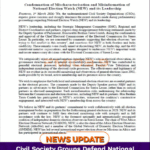By Davida Spaine-Solomon
Freetown, September 15, 2025- The Sierra Leone Film Guild, working in concert with key industry stakeholders, has formally dissolved the Sierra Leone Film Council (SLFC), citing a series of critical failures that include deviation from its founding mandate, jurisdictional conflicts, and an inability to deliver on essential outcomes for the country’s film industry.
Barber Sesay, Acting Chairman of the Sierra Leone Film Guild and President of the Directors Guild, described the decision as a necessary step toward restoring trust and transparency across the sector.
Established on June 24, 2014, at the Ministry of Information and Communications, the SLFC was born out of a 2013 agreement signed by more than fifteen film organizations, associations, and unions nationwide. Its original mission was ambitious and clear: to coordinate a National Film Policy, facilitate capacity development, promote inclusive governance, and build a sustainable platform to advance Sierra Leone’s film industry. However, according to the Guild, the Council gradually deviated from its mandate.
Speaking at a press conference in Freetown, Iscandri A. Sankoh, Secretary-General of the Sierra Leone Film Guild, outlined the rationale behind the dissolution. He noted that the SLFC had transformed itself from a coordinating and regulatory body into a self-styled trade union, a move that contradicted its foundational purpose and created a direct conflict with the Sierra Leone Film Industry, Labour and Marketing Guild (SL FILM Guild), the country’s only legally registered and recognized trade union for film professionals.
Sankoh further argued that the SLFC’s actions undermined the authority of the SL FILM Guild, which has served as the sole legitimate collective bargaining entity since 2012.
Beyond structural overreach, the Council was also faulted for failing to deliver on key promises, including the finalization of a National Film Policy, the passage of the Film Industry Act, effective decentralization, and meaningful stakeholder engagement. Stakeholders expressed concern over the Council’s loss of credibility, citing its lack of accountability and the alienation of many groups it was originally meant to represent.
Barber Sesay reiterated that the resolution to dissolve the SLFC was not only timely but essential. “This resolution is a necessary corrective measure,” he said. “It allows us to realign the governance of the film industry with its original vision and legal framework so we can focus on strengthening structures, policies, and opportunities for Sierra Leonean filmmakers.”
With the Council now officially dissolved, all advocacy, coordination, and representational functions will revert to the SL FILM Guild. The Guild has committed to working closely with government agencies, civil society organizations, and international partners to guide the next phase of development in Sierra Leone’s film sector. In his closing remarks, Sankoh reminded the public and stakeholders that the SLFC no longer holds any legal, regulatory, or representative authority.
“This is the beginning of a new chapter for Sierra Leonean film,” he said. “The Guild is committed to building a professional, inclusive, and sustainable platform that will advance our industry.”









